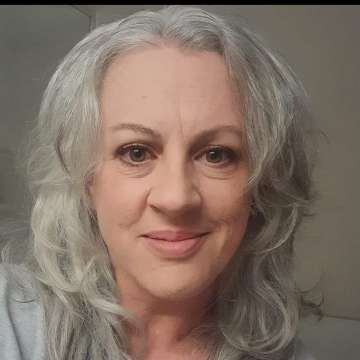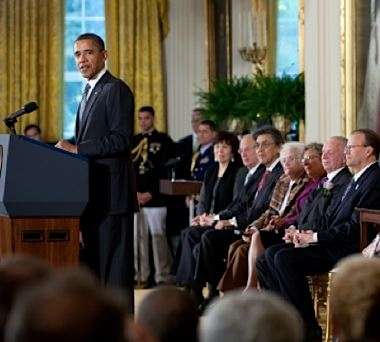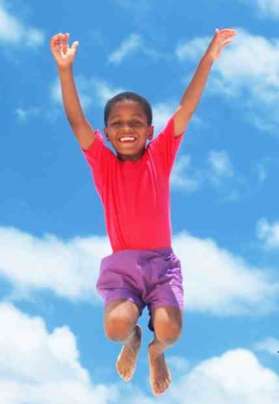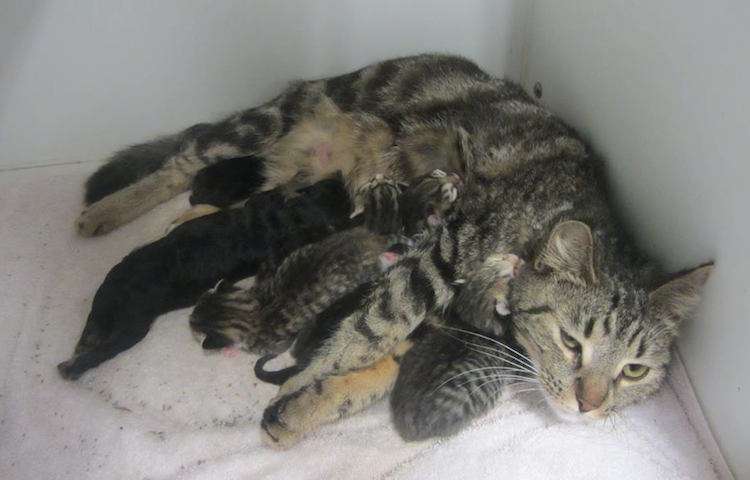Recognizing their good deeds, President Barack Obama yesterday awarded the nation's second-highest civilian honor to 13 compassionate Americans for their decades of service helping the poor, illiterate, disabled, and war-weary.
"They all faced that moment when you see a neighbor in need and you have to ask yourself a question," said the President in a White House ceremony. "They are united by the choices they've made. They could have made excuses for doing nothing. Instead, they chose to help."
This year's winners of the Presidential Citizens Medal included Americans from all walks of life.
John Keaveney, a Scottish immigrant, served two tours in Vietnam before coming back to establish a home for homeless and disabled veterans with addiction and mental health problems. Roberto Perez is an ordained Methodist pastor who counsels inmates and is president of a nonprofit organization that has taught more than 7 million people to read worldwide. After watching gang members stop to watch a young boy play his violin at the farmer's market, an L.A. resident, Dr. Michelle Martin, founded an organization that connects kids in underserved communities with instruments and music lessons.
The 13 medal-winners were selected from 6,000 citizens nominated by the public:
Steve and Liz Alderman from Armonk, New York
After Liz and Steve Alderman lost their son, Peter, in the World Trade Center attack on September 11, 2001, they founded the Peter C. Alderman Foundation. The Foundation works to heal the emotional wounds of victims of terrorism and mass violence by establishing clinics in post-conflict countries including Cambodia, Uganda, Rwanda, and Haiti.
Clarence Lee Alexander, Fort Yukon, Alaska
Sometimes called the "grandfather of tribal government" in Alaska for his long-held role as Chief of Fort Yukon, Clarence Alexander has worked extensively to clean up the Yukon River, resulting in the closure of numerous open-burning dumps and the removal or recycling of millions pounds of waste. Camilla Bloomquist, Penn Yan, New York
For more than 30 years, Milly Bloomquist has created and operated numerous programs to help the poor and underserved in Penn Yan, New York. She founded Food for the Needy and Christmas for the Needy, and recently implemented the Weekend Backpack Program in Yates County, which provides children free meals at their schools.
Judith Broder, Studio City, California
In 2004, Judith Broder created The Soldiers Project, which has worked to meet the mental health needs of service members, their families, and returning veterans. The Soldiers Project seeks to decrease the disruptive effects of repeated deployments, enhance post-deployment transition and re-integration, and mitigate suffering related to PTSD, TBI, substance abuse, domestic violence, and depression.
Vijaya Emani, Strongsville, Ohio
Vijaya Emani became a role model for victims of domestic abuse because of her strength and determination in overcoming domestic abuse in her own life. She broke a long held taboo in the Indian American community by speaking out about the issue publicly. Although she was killed in a tragic vehicle accident, her example and message live on.
John Keaveney, Los Angeles, California
In 1992, John Keaveney, a Vietnam combat veteran, founded New Directions, a home for homeless and disabled veterans with addiction and mental health problems. Keaveney overcame personal struggles and turned his life around in the 1980s. He decided that no veteran who asked for help should suffer what he did. When he began his program, he made a promise that no veteran would leave it unless he had a suit, a place to stay, and an income.
Roger Kemp, Leawood, Kansas
Roger Kemp faced the ultimate parent's nightmare when his daughter Ali, 19, was killed by a predator in the summer of 2002. In response Kemp created The Ali Kemp Defense Education (TAKE) Foundation. Inspired by his belief that his daughter could have survived if she had an edge on her attackers, TAKE has trained more than 46,000 women in self-defense.
Janice Langbehn, Lacey, Washington
While on vacation with her family in February 2007, Janice Langbehn's partner, Lisa Pond, suddenly fell ill and was rushed to the hospital. Langbehn was refused access to her partner, who had experienced a brain aneurysm and later died alone. She filed a federal lawsuit and her story received attention from President Obama, who went on to revise hospital visitation rights for gay and lesbian couples for hospitals receiving federal Medicare or Medicaid funds.
Ida Martin, Bluffton, South Carolina
Ida Martin created Bluffton Self Help to assist working families, disabled residents, and senior citizens in the Bluffton, South Carolina area when they suffered a financial crisis. In 2010 alone, Bluffton Self Help provided food to 11,600 people and clothing to almost 9,000 people. Additionally, Bluffton Self Help provided families with short-term emergency financial assistance toward housing and utility assistance, medical assistance, or children's program assistance.
Margaret Martin, Los Angeles, California
After observing LA gang members stop at a Hollywood market to listen to a kid playing Brahms on a small violin, she founded the Harmony Project in 2001 to make quality arts education available to those in the most underserved, gang-reduction zones of Los Angeles. The organization has provided instruments and tuition-free music lessons to thousands of children in Los Angeles who would otherwise have no access to classical music.
Michelle McIntyre-Brewer, Jefferson, Maryland
Michelle McIntyre-Brewer is a military spouse, mother, and founder of Soldier's List. She founded Soldier's List in 2003 to support high-risk service members and their families. Soldier's List has sent tens of thousands of care packages around the world providing critical medical relief. McIntyre-Brewer works diligently with the military community to educate families about their rights and responsibilities within Tricare and other services offered.
Roberto Perez, Miami, Florida
As President of Alfalit, a non-profit organization combating illiteracy, Roberto Perez has led the charge for fighting illiteracy from Africa to South America. The organization has helped 7 million people learn to read in 22 countries. Perez previously worked as a social worker and as an ordained Methodist Pastor counseling prison inmates and recovering alcoholics.










Be the first to comment